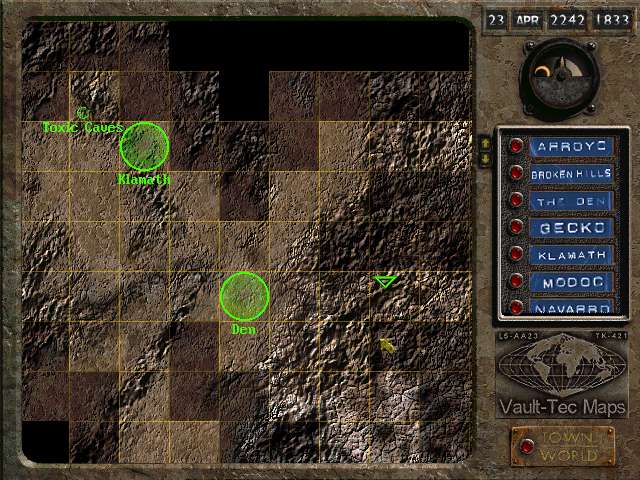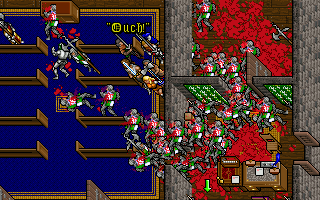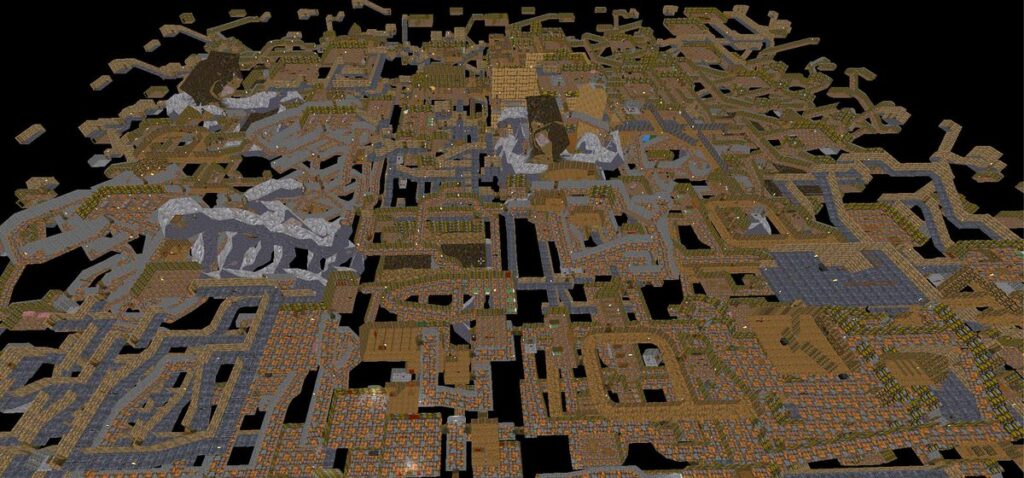I've been thinking about computer RPGs a lot recently, and trying to play a bunch. There's a quality that I've always loved about especially older computer RPGs: you really felt this sense of ambition behind them. You could sort of feel that there was someone who was super excited, who kept asking the question, "what if the player could also do X?" Often, when some of the older computer RPGs would come out, they would be super buggy on release. I feel like this is because there was a prioritization on increasing the possibility space (which invites bugs) and not prioritizing polish (which involves bug-fixing).
I think I have a fascination with CRPGs because I feel like games like Arcanum, Fallout 1 and 2, Daggerfall, Temple of Elemental Evil, Wizardry 8, most of the Ultima games, some of the older Gold Box games, and many others, embody some of the original promises of videogames better than anything else I've seen. These games were made, it seems to me, with a real spirit of ambition toward some goal of "fantasy simulation on the computer".
 The map view in the original Fallout. You could move anywhere, at any time, encountering random events and secret locations along the way.
The map view in the original Fallout. You could move anywhere, at any time, encountering random events and secret locations along the way.
Perhaps I, like every other human being, am simply romanticizing the media that I played when I was coming of age, the games I played in my teens and early 20s. If I had been born 10 years later I would be crowing about Mass Effect instead. I guess it's hard for me to completely disprove this, but many of the games on my list were made well before my time. Some were made before I was even born, and some of these games, like the early Ultimas, I haven't even played myself, I've only read about them, and even in reading about them the sense of ambition is clear. I would also put a game like Divinity Original Sin perhaps into this category, as I feel that it is also a good example of what I'm talking about, and I only played that a few years ago.
"The Project" of the CRPG
The story of the computer RPG, as I see it, is that in the late 70s, you had all these solo developers trying to more or less reproduce D&D on the computer. Computers were, and still are, extremely limited in what could be done, especially for a one-player game. We don't have generalized AI that can make NPCs who act and respond the way that a person would. We don't have a thoughtful human-like AI who can do the work of DMing. So, even if developers didn't want it, what they really had was a process of designing some interactive system, much like if they were designing a strategy game or a puzzle. And frankly, that's cool! That's way more interesting to me than if they really were able to just re-produce D&D faithfully.
I think there was this project of working on that and building on what had come before. The development of the Ultima series is really the "main character" in the story of the development of the computer RPG: here was a project spanning almost two decades that culminated in Ultima VII, one of the most interactive and deep (if also deeply flawed) RPGs ever made. Ultima VII is seriously nuts. From its Wikipedia page:
The gameworld of Ultima VII is renowned for its interactivity: virtually everything not nailed to the ground (and not excessively heavy) can be moved, taken, or interacted with in some way. It is possible, for instance, to bake bread, to forge weapons, to play musical instruments, to paint a self-portrait, and to change a baby's swaddling. The Avatar and his companions, if not fed regularly, will complain of hunger pangs and severe thirst, and will even perish if these matters are not attended to eventually. If they come across a disgusting or gruesome scene, they may groan and vomit; sufficient intake of strong alcoholic beverages will also result in visible nausea.
This might be a good time to talk a bit about what the value of such a thing is. There is a "fantasy simulation" value, for sure: this idea that you're in some different world
You could argue that this project, the project of simulating a fantasy world, started because of capitalism. After all, almost all of these developers were in business trying to sell games. By the time Ultima VII came out Origin Systems, the developer of Ultima, was "in business" enough for Electronic Arts to buy them up in 1992. I think also, though, capitalism is ultimately what killed off this project. After being purchased by EA, Origin produced Ultima VIII, generally considered to be a horrible game and barely a CRPG:
Richard Garriott later said he delegated most of the work on Ultima VIII to others: "... I sacrificed everything to appease stockholders, which was a mistake. We probably shipped it three months unfinished".[4] He reiterated this in 2016 saying that EA was not to be blamed for the game's poor reception. "It really was smart people with good data [and] good evidence to show 'here's why we've concluded this information. We would like you to embrace it'...and I embraced it!"
(I love that he says that EA wasn't to be blamed here. It's like "it's not your fault... it's my fault for trusting an incompetent moron like you!")
With that said, Origin still had much to contribute to the CRPG project, albeit in a slightly different way, with the MMO Ultima Online. UO in its later years became basically "Everquest with worse graphics", but in the early days, it was absolutely a continuation of the RPG project. In fact, some of the coolest aspects of UO were things like the notoriety system and the weird levels of interactions you could have with NPCs. If I recall correctly, you could befriend and even have a romance with... I want to say any NPC in the game? It's those kinds of wild, daring concepts that make me love "the project" of the CRPG, more than necessarily any of the individual games themselves perhaps.
Before I go further let me give a nice clear explanation of what it is I am calling the CRPG "project": a collective mission to pursue new ways to create fantasy world or adventure simulations. These games push the boundaries in terms of interactivity in ways that increase real immersion*. Objects that respond to physics, tools that have many uses, a wide variety of ways that NPCs can be interacted with and related to, and systems that have emergent/toy-like properties all are good examples. CRPGs that are part of "the project" are usually very good toys, to use my nomenclature. Most games these days have RPG elements, but something like a JRPG, as a point of comparison, is a much more tightly controlled pre-authored experience that's often much more linear and has fewer emergent systemic properties.
* not the video technology stuff that gets hyped as such. Get the idea that "4K 120 FPS lush visual landscapes is where immersion comes from" completely out of your head. It is marketing propaganda, it's "blast processing", it's like this never ending Ouroboros of hype and nothing more. Of course visuals, audio, and everything else about the application matters, but as anyone who has played older games can tell you, they've been every bit as engrossed in the games of their time as anyone else.
You just want a murder hobo simulator
Before I go any further, I think it's important to talk about patterns we find in the existing manifestations of games that were indeed part of "the project". Very early in the Ultima series, designer Richard Garriott noticed that when he gave players the ability to interact with the world, players started behaving very badly.

Garriott tried to minimize the murder-hobo-ism with his Virtues system (but not so much in Ultima VII)
The classic manifestation of this is the "murder hobo": players soon become little more than a marauding godlike power rolling into various towns stealing everything and killing anyone they feel they can get away with (up to and including possibly "everyone"). I've definitely gone this route myself more than a few times. RPGs and strategy games both suffer from the same cultural, or language problem: we understand action in videogames largely through a language of violence and war. Everything is framed around violence, even the "non violent" possibilities in Fallout are still framed in relation to the naturally assumed violence that would normally be there. "Adventures", as a concept, are often largely built around violent dehumanizing themes, as well as colonialism, domination, exploitation, and other similar problems.
So, when we conceive of a game where you have a lot of freedom, the natural inclination of both players and designers is stuff like "you can kill any NPC", "you can steal from anyone", "you can destroy things", "you can seize power by force", etc. Even just writing this stuff out right now, I'm getting a little bit excited, because of a lifetime of this kind of thing being so hyped, and the ways that I've been trained to think that "fun comes from obtaining power at someone else's expense".
I don't want to downplay how much this "kill everyone in town" aesthetic is a problem. Like, we call it "murder hobo simulator" and it sounds all cute, but it doesn't sound as cute when you call it "school shooter simulator", and this is really not that far off of a characterization, if you think about it.
It doesn't have to be this way, of course. In life, and in the fantasy worlds we create in other mediums, we do many things with other people. And it's not just violence that can be abstracted out into numeric or systemic expressions; the Sims, dating sims and many other kinds of games have done that for years. I'm not against violence as an option in these games, but I recognize that right now, if there's going to be interactivity of *any* kind at all, it's going to be along the lines of violence. With that said, "can kill or not" really should not be the only way you can interact with NPCs in these worlds, and the fact that it is is a terrible indictment of our society and our imagination.
The end of the project
It was really around 2000-2005 that the project was killed off. The games industry got bigger and bigger, and the expectations for content got more and more expensive to produce. Numerous great companies involved in this project at this time faced a choice: sell out, or die. And by "sell out", I mean, produce video games that are first and foremost consumer products that are "CRPG-flavored". No companies, as far as I know, were able to continue the project through this time. Companies like Bethesda switched to making games that were essentially more like Diablo or one-player Everquest. Elder Scrolls 2: Daggerfall was one of the most ambitious videogames of all time. It has, I think still, the largest overmap in any videogame, and the dungeon maps are randomly generated labyrinths that you absolutely can and will get lost in.

Actually, Daggerfall was arguably a little too "the project" for its own good, and I personally find Elder Scrolls 3: Morrowind to be a much more playable but stil




































